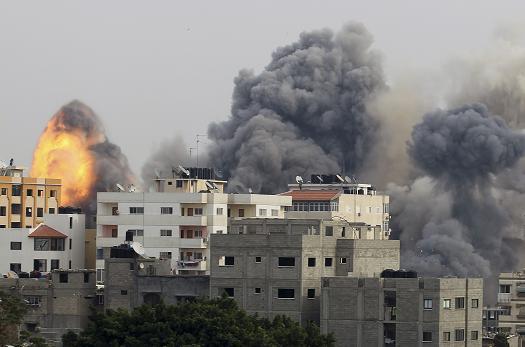Israel and its Hamas foes are each claiming gains from a week of fighting in and around Gaza, but analysts doubt if the army of a sovereign state can ever score a conclusive win against an irregular force rooted in its local community.
“There is such a thing, but it happens when the struggle is waged on a state’s own territory,” said Tel Aviv University’s Shlomo Brom, former head of strategic planning of the Israeli military.
“I don’t think there is a precedent for being able to win when an organisation is operating from territory which is not your territory,” he told AFP.
“When there is a conflict between two societies, two peoples, it cannot be solved in the long term only by military means, only if you physically eliminate the other side,” Brom added.
While Israel’s well-trained and technologically-advanced military could conquer the 360 square kilometre (134 square mile) strip, the cost would be heavy in lives and in the all-important international support that Israel enjoyed during its campaign against rocket fire from Gaza.
“Can we win Gaza over from Hamas, yes definitely. If we decide to do it we’ll do it,” Israeli Intelligence Minister Dan Meridor said in response to a journalist’s question on Thursday.
“Then we have to ask ourselves what to do when we are there,” he added. “This time we decided that this is not our goal and we hope that we won’t have to do it.”
At the start of the Israeli operation, Defence Minister Ehud Barak spelled out its four aims: to bolster the Jewish state’s deterrent posture, to seriously damage the militants’ rocket launching network, to strike “a painful blow at Hamas and the other terrorist organisations,” and to safeguard southern Israeli communities.
Meridor said those goals were fulfilled.
“We didn’t say we were going to win the war against Hamas,” he said. “What we want to do is to make them rethink if this is worth it or not…this is a limited goal which I think has been fully achieved.”
Yediot Aharonot defence analyst Alex Fishman disagreed.
“This is a victory for Hamas,” he wrote on Wednesday, as the truce was emerging. “It is important to remember that relations between Israel and Hamas are not symmetrical, and therefore their accomplishments must be assessed asymmetrically.”
“In contrast with reports over the last few days, the security establishment did not succeed in injuring major terror activists, certainly not in numbers that would cause any real damage to the other side.”
On a high after the truce, Hamas issued a statement on Thursday saying that its premier Ismail Haniya had received formal congratulations from Palestinian president Mahmud Abbas, who is based in the West Bank and has little authority in Gaza.
But some analysts said that because Israel is keen to avoid a deterioration of relations with Egypt, with whom it has a three-decade-old truce, it may now be more willing than ever to engage in direct talks with “political Islam”.
Israel’s current position “implies a greater tolerance of the Muslim Brotherhood in Egypt, and the Muslim Brotherhood in that very same Gaza Strip,” said Yossi Alpher, a peace process expert.
“Though we cannot yet speak of a new political strategy toward political Islam, the agreement (reached Wednesday) shows that Israel recognises that it is living in a Sunni Arab world,” Alpher said.
The week-long confrontation between Israel and Gaza militants claimed the lives of 163 Palestinians and injured 1,235, according to the Hamas health ministry.
In Israel, rocket fire from Gaza killed six people — four civilians and two soldiers — and another 240 were injured, the military said.
Meridor said that “thousands” of Hamas rockets were destroyed but could not say how many remained.
“If Hamas and Islamic Jihad together had around 10,000 rockets…several thousand are not there anymore,” he said.










